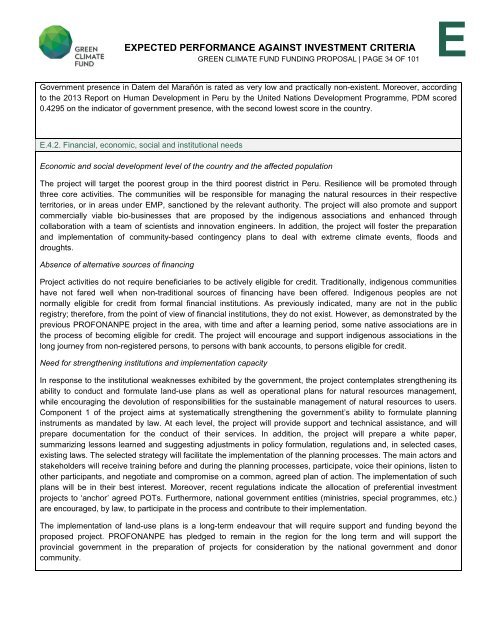proposals – Addendum
bf35cb34-05cf-4f96-a8fb-0adfa54cc3c9
bf35cb34-05cf-4f96-a8fb-0adfa54cc3c9
You also want an ePaper? Increase the reach of your titles
YUMPU automatically turns print PDFs into web optimized ePapers that Google loves.
EXPECTED PERFORMANCE AGAINST INVESTMENT CRITERIA<br />
GREEN CLIMATE FUND FUNDING PROPOSAL | PAGE 34 OF 101<br />
E<br />
Government presence in Datem del Marañón is rated as very low and practically non-existent. Moreover, according<br />
to the 2013 Report on Human Development in Peru by the United Nations Development Programme, PDM scored<br />
0.4295 on the indicator of government presence, with the second lowest score in the country.<br />
E.4.2. Financial, economic, social and institutional needs<br />
Economic and social development level of the country and the affected population<br />
The project will target the poorest group in the third poorest district in Peru. Resilience will be promoted through<br />
three core activities. The communities will be responsible for managing the natural resources in their respective<br />
territories, or in areas under EMP, sanctioned by the relevant authority. The project will also promote and support<br />
commercially viable bio-businesses that are proposed by the indigenous associations and enhanced through<br />
collaboration with a team of scientists and innovation engineers. In addition, the project will foster the preparation<br />
and implementation of community-based contingency plans to deal with extreme climate events, floods and<br />
droughts.<br />
Absence of alternative sources of financing<br />
Project activities do not require beneficiaries to be actively eligible for credit. Traditionally, indigenous communities<br />
have not fared well when non-traditional sources of financing have been offered. Indigenous peoples are not<br />
normally eligible for credit from formal financial institutions. As previously indicated, many are not in the public<br />
registry; therefore, from the point of view of financial institutions, they do not exist. However, as demonstrated by the<br />
previous PROFONANPE project in the area, with time and after a learning period, some native associations are in<br />
the process of becoming eligible for credit. The project will encourage and support indigenous associations in the<br />
long journey from non-registered persons, to persons with bank accounts, to persons eligible for credit.<br />
Need for strengthening institutions and implementation capacity<br />
In response to the institutional weaknesses exhibited by the government, the project contemplates strengthening its<br />
ability to conduct and formulate land-use plans as well as operational plans for natural resources management,<br />
while encouraging the devolution of responsibilities for the sustainable management of natural resources to users.<br />
Component 1 of the project aims at systematically strengthening the government’s ability to formulate planning<br />
instruments as mandated by law. At each level, the project will provide support and technical assistance, and will<br />
prepare documentation for the conduct of their services. In addition, the project will prepare a white paper,<br />
summarizing lessons learned and suggesting adjustments in policy formulation, regulations and, in selected cases,<br />
existing laws. The selected strategy will facilitate the implementation of the planning processes. The main actors and<br />
stakeholders will receive training before and during the planning processes, participate, voice their opinions, listen to<br />
other participants, and negotiate and compromise on a common, agreed plan of action. The implementation of such<br />
plans will be in their best interest. Moreover, recent regulations indicate the allocation of preferential investment<br />
projects to ‘anchor’ agreed POTs. Furthermore, national government entities (ministries, special programmes, etc.)<br />
are encouraged, by law, to participate in the process and contribute to their implementation.<br />
The implementation of land-use plans is a long-term endeavour that will require support and funding beyond the<br />
proposed project. PROFONANPE has pledged to remain in the region for the long term and will support the<br />
provincial government in the preparation of projects for consideration by the national government and donor<br />
community.


